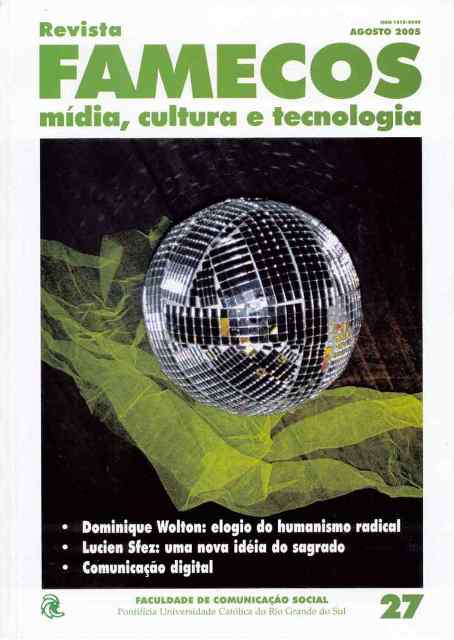Internet and political participation in democratic societies
DOI:
https://doi.org/10.15448/1980-3729.2005.27.3323Keywords:
Political participation, internet, political communicationAbstract
This article deals with the most recent literature devoted to the political effects of Internet and, very specially, to the issue of citizen’s participation in the policy sphere. Its main purpose is the examination of one hypothesis according to which the Internet is frequently defined as a communicational environment that would transform the present withdrawal of masses from political participation.Downloads
References
ALBUQUERQUE, A.; SÁ, S. A tragédia dos ursos na China e outras mensagens: observações sobre e-política e globalização In: FAUSTO NETO, A. (Org.) Práticas mediáticas e espaço público. Porto Alegre: Editora da PUC/RS, p. 143-181, 2001.
BARBER, B. Strong Democracy: participatory politics for a new age. Berkeley: University of California Press, 1984.
BARNETT, S. New Media, Old Problems: new technology and the political process. European Journal of Communication, v. 12, n. 2, p. 193–218, 1997.
BERELSON, B. Democratic Theory and Public Opinion. Public Opinion Quarterly, v. 16, n. 3, p. 313–30, 1952.
BLUMLER, J.G.; GUREVITCH, M. The Crisis of Public Communication. London: Routledge, 1995.
BUCHSTEIN, H. Bytes that Bite: The Internet and Deliberative Democracy. Constellations, v. 4, n. 2, p. 248-263, 1997.
BUCY, E. P.; D’ANGELO, P. The Crisis of Political Communication: Normative Critiques of News and Democratic Processes. Communication Yearbook, v. 22, p. 301–39, 1999.
BUCY, E. P.; GREGSON, K. S. Media participation: A legitimizing mechanism of mass democracy. New Media & Society, v. 3, n. 3, p. 357–380, 2000.
CARLSON, T.; DJUPSUND, G. Old Wine in New Bottles? The 1999 Finnish Election Campaign on the Internet. Harvard International Journal of Press Politics, v. 6, n. 1, p. 68-87, 2001.
CHOUCRI, N. CyberPolitics in International Relations. International Political Science Review, v. 21, n. 3, p. 243–263, 2000.
COBB, R.W.; ELDER, C.D. Participation in American politics: The dynamics of Agenda-Building, 2a. ed. Baltimore, MD: Johns Hopkins University Press, 1983.
COOMBS, W.T.; CUTBIRTH, C.W. Mediated political communication, the Internet, and the new knowledge elites: prospects and portents. Telematics and Informatics, v. 15, p. 203-217, 1998.
CONWAY, M. M. Political Participation in the United States. Washington, DC: CQ Press, 2000.
CURRAN, J. Mass Media and Democracy: A Reappraisal. In: CURRAN, J.; GUREVITCH, M. (Org.) Mass Media and Society. London: Edward Arnold, p. 82–117, 1991.
DAHLBERG, L. Democracy via Cyberspace. New Media & Society, v. 3,
n. 2, p. 157–177, 2001.
DAHLGREN, P. The Public Sphere and the Net. In: BENNETT, W. L. e ENTMAN, R. M. (Org.) Mediated Politics: Communication in the Future of Democracy. Cambridge: Cambridge University Press, p. 33-55, 2001.
DEAN, J. Why the Net is not a Public Sphere. Constellations, v. 10, n. 1, p. 95-112, 2003.
DOWNEY, J.; FENTON, N. New Media, Counter Publicity and the Public Sphere. New Media & Society, v. 5, n. 2, p. 95-112, 2003.
ENTMAN, R. M. Democracy without Citizens: Media and the Decay of American Politics. Oxford: Oxford University Press, 1989.
GIBSON, R. Elections Online: Assessing Internet Voting in Light of the Arizona Democratic Primary. Political Science Quarterly, v. 116, n. 4, p. 561-583, 2001.
GIMMLER, A. Deliberative Democracy, the Public Sphere and the Internet. Philosophy & Social Criticism, n. 27, v. 4, p.21–39, 2001.
GOMES, W. Internet, Censura e Liberdade. In: PAIVA, R. (Org.) Ética, Cidadania e Imprensa. Rio de Janeiro: Mauad, p. 133-164, 2002.
_____. Transformações da política na era da comunicação de massa. São Paulo: Paulus, 2004.
HELD, D. Models of democracy. Stanford: Stanford University Press, 1987.
HACKER, K.L. Missing Links in the Evolution of Electronic Democratization. Media, Culture & Society, v. 18, n. 2, p. 213-232, 1996.
HAMLETT, P. W. Technology Theory and Deliberative Democracy. Science, Technology, & Human Values, v. 28, n. 1, p. 112-150, 2003.
JAMIESON, K. H. Dirty Politics: Deception, Distraction, and Democracy. Oxford: Oxford University Press, 1992.
JENSEN, J.L. Public Spheres on the Internet: Anarchic or Government-Sponsored - A Comparison. Scandinavian Political Studies, v. 26, n. 4, p. 349-374, 2003.
KALLIO, K.; KÄKÖNEN, J. (2002) Internet in improving democracy? Some critical remarks. Trabalho apresentado no Euricom colloquium: Electronic networks and democratic engagement, Nijmegen, 2002. Disponível em: http://baserv.uci.kun.nl/~jankow/Euricom/abstracts/N%20Kallio%20&%20Kakonen.htm. Acesso em: 26 out. 2006.
MAIA, R. Redes cívicas e internet: do ambiente informativo denso às condições da deliberação pública. In: EISENBERG, J.; CEPIK, M. (Org.) Internet e política: Teorias da democracia eletrônica. Belo Horizonte: Editora da UFMG, p. 46-72, 2002.
MILBRATH, L.W. Political Participation: How and why do People get involved in Politics? Chicago: Rand McNally, 1965.
NEUMAN, W.R. The Paradox of Mass Politics: Knowledge and Opinion in the American Electorate. Cambridge, MA: Harvard University Press, 1986.
PATTERSON, T. Out of Order. New York: Vintage Books, 1994.
POSTMAN, N. Amusing Ourselves to Death: Public Discourse in the Age of Show Business. New York: Penguin Books, 1985.
SCHUDSON, M. The Good Citizen: A History of American Civic Life. New York: Free Press, 1998.
VERBA, S.; SCHLOZMAN, K. L.; BRADY, H. E. Voice and Equality: Civic Volunteerism in American Politics. Cambridge, MA: Harvard University Press, 1995.
WILHELM, A. G. Democracy in the Digital Age: Challenges to Political Life in Cyberspace. New York, Routledge, 2000.
YENGAR, S.; KINDER, D. R. News that Mathers: Television and American Opinion. Chicago: The University of Chicago Press, 1987.
Downloads
Published
How to Cite
Issue
Section
License
Copyright
The submission of originals to Revista Famecos implies the transfer by the authors of the right for publication. Authors retain copyright and grant the journal right of first publication. If the authors wish to include the same data into another publication, they must cite Revista Famecos as the site of original publication.
Creative Commons License
Except where otherwise specified, material published in this journal is licensed under a Creative Commons Attribution 4.0 International license, which allows unrestricted use, distribution and reproduction in any medium, provided the original publication is correctly cited.






